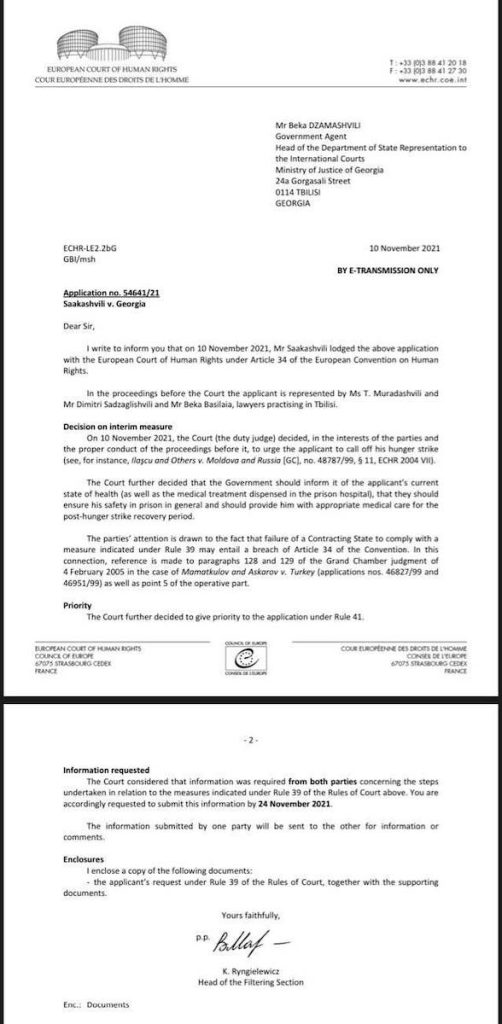European Court of Human Rights releases interim ruling on Saakashvili's case
ECHR interim decision on Saakashvili’s case
On November 10, ECHR issued an interim ruling on “temporary measures” in regards to Mikheil Saakashvili‘s hunger strike, his health and safety
Due to the content of the “temporary measures”, this decision of the Strasbourg court means that the European Court of Human Rights has seen the danger of irreparable damage to Saakashvili’s life and health.
What does the term ‘temporary measures’ mean?
Upon receiving the appeal, the Strasbourg court may require the state to take certain interim measures before the court considers the case.
“Temporary measures” are taken by Strasbourg when irreparable things can happen if the court decision is delayed – for example, the applicant’s life is in danger, they can be tortured, etc. If this does not happen, the Strasbourg court can ask the state to refrain from certain actions – for example, not to return a person to a country where he or she is likely to face the threat of death or torture.
Saakashvili’s lawyers applied to Strasbourg with a request to take temporary measures. The request of Saakashvili’s lawyers was not considered unjustified by the court and was accepted in the proceedings.
Strasbourg instructed the parties – both Saakashvili and the respondent Ministry of Justice on behalf of the state to take certain measures.
● European Court urges Mikheil Saakashvili to end hunger strike. (A similar appeal is part of the case law of all the hunger strikers. The same appeals were made to the European Court, for example, to Nadezhda Savchenko and Oleg Sentsov).
● The Government of Georgia has been instructed to provide Strasbourg with detailed information on the ex-President’s health condition and the medical care provided to him in the prison hospital by November 24 – how the patient is currently being treated, including what treatment is available in prison, etc.
●In addition to quality treatment of Saakashvili, the authorities were also instructed to ensure his safety in the penitentiary institution;
●The government was also instructed to provide appropriate medical care to Mikheil Saakashvili during the post- hunger strike period or after the end of the hunger strike in order to restore his health (provided that Mikheil Saakashvili ceases to starve).

However, according to the European Court of Human Rights, if the Georgian government fails to take these measures (i.e. to protect Saakashvili’s health and safety and provide proper information to Strasbourg), then the Georgian government may be found to be violating Article 34 of the European Convention on Human Rights. This article obliges the state, not to hinder a person / organization / group of persons, to appeal to the European Court.
The letter received from Strasbourg was followed by different interpretations in different political camps:
What Saakashvili’s lawyers say
Mikheil Saakashvili’s lawyers note that the Strasbourg court granted their request for a temporary measure.
According to Nika Gvaramia, Saakashvili’s lawyer, the main result is that the case of the ex-president has been given priority by Strasbourg, which means that all actions related to this case will be considered in a short period of time.
He also said that the important result is that Strasbourg calls on Mikheil Saakashvili to end the hunger strike, which means that by the decision of Strasbourg, the fact of Mikheil Saakashvili’s hunger strike is already internationally recognized.
“The court instructed the Georgian authorities to immediately inform them of Mikheil Saakashvili’s current state of health and to provide detailed information on all the medical procedures performed on him at the moment in the 18th facility”, Gvaramia said.
“We have been instructed to provide daily updates to the Strasbourg court on the condition of Mikheil Saakashvili, both in terms of health and safety”, he added.
Gvaramia says that in the decision, the European Court did not directly indicate the issue of Saakashvili’s transfer to civilian clinic, however, it indicated the need for high standard of the treatment.
“Obviously we would prefer it to have a direct reference to the transfer, but such things do not happen in practice”, Gvaramia said.
He also notes that on November 24 this information will be reconciled once again and with a high probability, the Strasbourg court will once again discuss what is happening.
- Is Saakashvili a political prisoner? Lawyers and human rights defenders’ explain.
- Saakashvili’s hunger strike almost hit a month – what do we know about his health and what future awaits him?
- MEP Von Cramon: Georgia’s ruling party has never been further away from EU membership
What the government says
A different interpretation of the Strasbourg decision was published by the Minister of Justice Rati Bregadze.
He said a Strasbourg court had rejected Saakashvili’s complaint to transfer him to a private clinic and demanded him to end the hunger strike.
According to the Minister, the Government must provide the European Court of Human Rights with information on the applicant’s health and safety by 24 November 2021.
Mikheil Saakashvili has been on hunger strike for more than 40 days since he was arrested on October 1.
On November 8, he was transferred from Rustavi Prison to Gldani Prison Hospital against his will in order to “prevent deterioration of his health”. Saakashvili himself, his family, doctors and the Public Defender’s Office opposed his transfer to the prison hospital on the grounds that the prison hospital lacked the medical equipment needed to treat Saakashvili and was also unsafe.
The Public Defender inspected the medical facility in Gldani Prison several times. The ombudsman wrote in the reports that the conditions in the clinic were inappropriate for the treatment of the patient.
Elene Khoshtaria, the leader of the political party “Droa”, started a hunger strike in the parliament demanding to take Saakashvili to the civil clinic.
In parallel with these processes, on November 8, the opposition launched large-scale, continuous protests demanding the release of Mikheil Saakashvili and the calling of early elections.



















